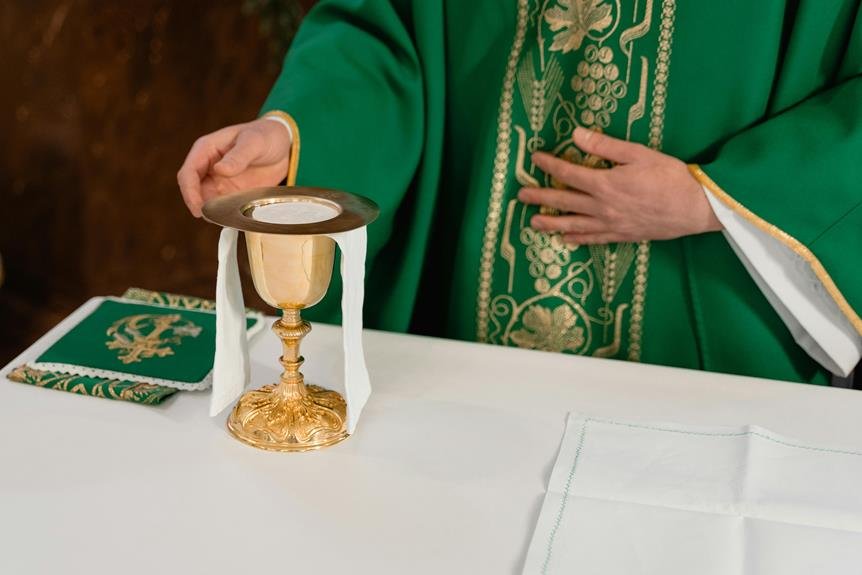Is Anointing Oil Biblical and Should We Use It Today?
Anointing oil is indeed biblical, with roots in both the Old and New Scriptures. We see it used for consecration, healing, and symbolizing God's presence. While not mandatory for all Christians today, many still find value in using anointing oil as a tangible expression of faith and reliance on God's power. It's often used in prayer for healing, dedication of people or objects, and as a reminder of the Holy Spirit's work. Whether we choose to use it or not, the key is understanding its spiritual significance and focusing on our relationship with God. There's much more to explore about this ancient practice and its modern applications.
Biblical Origins of Anointing Oil
Oil plays a significant role in biblical history. From ancient times, it has been used in religious rituals and spiritual practices, holding deep historical significance across various cultural traditions.
In the Old Covenant, we find anointing oil used to consecrate priests, kings, and prophets, setting them apart for God's service. The recipe for this special oil is even detailed in Exodus, highlighting its importance. This practice shares similarities with the seven ordinances of the Catholic Church, which also involve outward signs instituted by Christ for grace.
We see anointing with oil continuing into the New Covenant, where it's used in healing practices and as a symbol of the Holy Spirit's presence. This rich biblical background shows us that anointing oil isn't just a cultural custom, but a meaningful spiritual practice with roots in Scripture. Understanding its origins helps us appreciate its ongoing use in some Christian denominations today.
Old Testament Anointing Practices
Frequently, we encounter the practice of anointing in the Old Scripture, where it played a pivotal role in consecrating individuals and objects for God's service. This ritual significance extended to various aspects of Israelite life, with priestly anointing being particularly prominent.
We see priests, kings, and prophets being anointed with oil as a symbol of their divine appointment and consecration to God's work.
The anointing of tabernacle furnishings also held great importance, setting these objects apart for sacred use. The recipe for the anointing oil, detailed in Exodus 30:23-24, underscores its special nature.
New Testament Perspectives
While the Old Agreement established anointing as a sacred practice, the New Agreement brings fresh perspectives on its significance and application. In the New Scripture, we see a shift towards using anointing oil in healing prayers and as a symbol of community support. The apostles anointed the sick with oil, emphasizing faith and the power of prayer in healing. This practice wasn't limited to religious leaders but extended to the entire believing community.
The Sacrament of Anointing in Catholicism continues this tradition, offering spiritual fortification and grace to those facing serious illness.
We're encouraged to call upon the elders of the church to pray over and anoint the sick, highlighting the importance of communal faith and support in times of need. While anointing with oil isn't presented as a requirement for healing, it serves as a tangible expression of our faith and reliance on God's power. The New Scripture maintains the spiritual significance of anointing while broadening its application among believers.
Symbolism and Spiritual Significance
Beyond its physical application, anointing oil carries deep symbolism and spiritual significance in Christian practice. It represents:
- Consecration to God
- Divine blessing and favor
- Empowerment for service
When we use anointing oil, we're not just performing a ritual. We're expressing our faith in God's healing power and seeking His divine blessing. The act of anointing symbolizes setting someone or something apart for God's purposes. This practice is rooted in biblical tradition and is recognized across various Catholic Bible translations, emphasizing its importance in Christian faith.
It's a tangible way to invite the Holy Spirit's presence and work in our lives. While the oil itself doesn't have magical properties, it serves as a physical reminder of God's spiritual anointing. As we apply the oil, we're demonstrating our reliance on God's power and our submission to His will, whether for healing, guidance, or spiritual growth.
Jesus as the Anointed One
The title "Christ" itself means "Anointed One," pointing to Jesus' unique role as the promised Messiah. Throughout the Old Scripture, we find Messiah prophecies that foretell a coming Deliverer. Jesus fulfills these prophecies as the ultimate Anointed One.
Unlike the physical anointing with oil practiced in ancient times, Jesus received a spiritual consecration. The New Writings confirm that He was consecrated with the Holy Spirit, setting Him apart for His divine mission.
This spiritual consecration empowered Jesus for His ministry and marked Him as God's chosen servant.
As followers of Christ, we can take comfort in knowing that Jesus' consecration extends to us. Through faith in Him, we receive the Holy Spirit and become part of God's anointed people, called to carry out His purposes in the world.
Anointing the Sick Today
Many Christians today wonder about the practice of anointing the sick with oil. This biblical custom, rooted in James 5:14-15, is still observed in some healing communities. It's a meaningful way to express spiritual trust and seek God's healing power.
When considering this practice, we should remember:
- It's not a magical cure but a symbol of faith and prayer
- The focus is on God's power, not the oil itself
- It's often done in community, involving church elders
While not every Christian denomination practices anointing the sick, it remains a valid expression of faith for many believers. If you're interested in this practice, speak with your church leaders about their stance and how it might be incorporated into your community's approach to prayer for healing.
Modern Christian Practices
Christians today carry on a variety of practices rooted in biblical traditions, including the use of anointing oil. Many denominations incorporate anointing oil in healing rituals, often combined with prayer and laying on of hands. This practice reflects the New Scripture's encouragement to anoint the sick with oil while praying for their recovery.
Community support plays a pivotal role in these modern practices. When a believer is ill or in need of spiritual strengthening, fellow church members may gather to offer prayers and participate in anointing ceremonies. Some churches designate elders or pastors to perform these rituals, while others encourage all believers to participate.
The use of anointing oil serves as a tangible symbol of God's presence and the community's faith in His healing power. While not universally practiced, many Christians find comfort and spiritual significance in this ancient tradition.
Applying Biblical Wisdom
Through careful study of Scripture, we can glean wisdom on how to apply biblical anointing practices today. While not a requirement, anointing with oil can be a meaningful act of faith when used thoughtfully. We should consider:
- Using anointing oil as a symbol of consecration and dedication to God
- Incorporating it into healing prayers for the sick
- Employing it as a gesture of community support and spiritual trust
When we choose to use anointing oil, let's do so with reverence and understanding of its biblical significance. It's not a magic formula but a physical representation of our faith and reliance on God's power. We can integrate this practice into our spiritual lives, always remembering that it's the prayer of faith, not the oil itself, that brings healing and blessing.
Frequently Asked Questions
Can Any Type of Oil Be Used for Anointing?
We can use different oils for anointing, as there aren't strict biblical guidelines specifying a particular type. However, we should consider using oils that are meaningful and pure, respecting the sacred nature of the practice.
Is There a Specific Prayer to Say When Anointing Someone?
When we anoint someone, there's no specific prayer required. However, we should focus on the Biblical significance of the act. We can use our own words, emphasizing faith and God's healing power. The proper technique matters less than our sincerity.
How Often Should a Person Be Anointed With Oil?
We don't have a set rule for how often to anoint with oil. It's not about frequency but biblical significance. We can anoint as needed for healing, consecration, or spiritual purposes, guided by faith and community support.
Can Laypeople Anoint Others, or Only Church Leaders?
We can see layperson involvement in anointing, though it's often associated with church leaders. While there aren't strict anointing guidelines, it's typically performed by elders or pastors. However, we're all called to pray for one another's healing.
Are There Any Potential Risks or Side Effects of Using Anointing Oil?
We should be mindful of potential medical concerns when using anointing oil. It's important to take into account allergic reactions, especially to specific ingredients. We'd want to guarantee everyone's safety while still honoring this meaningful practice.







